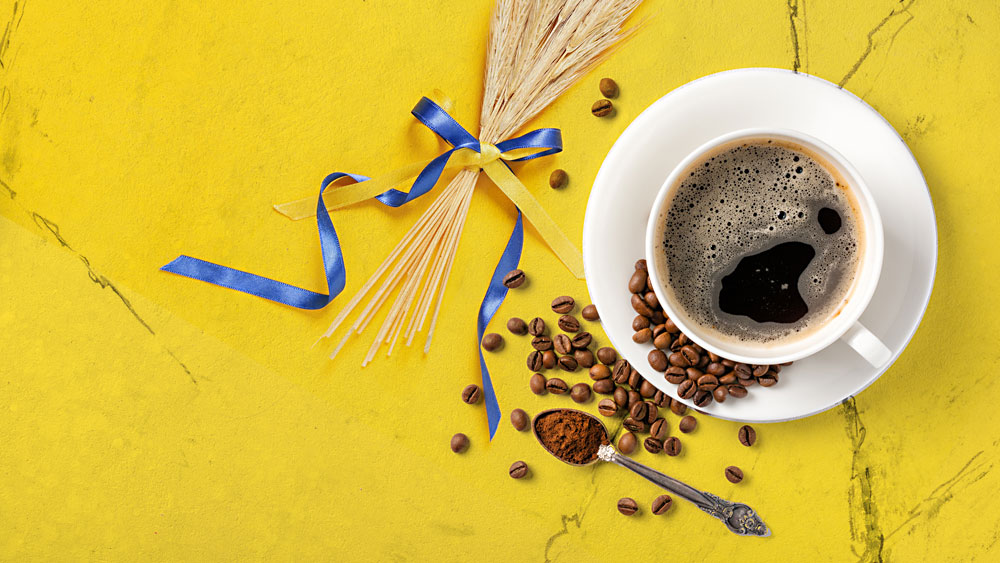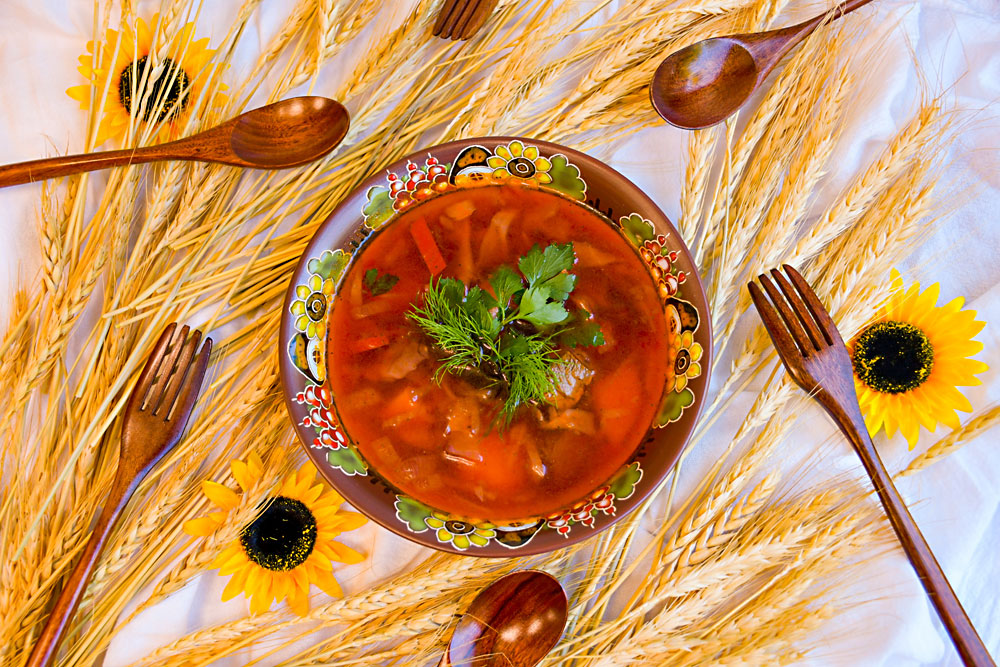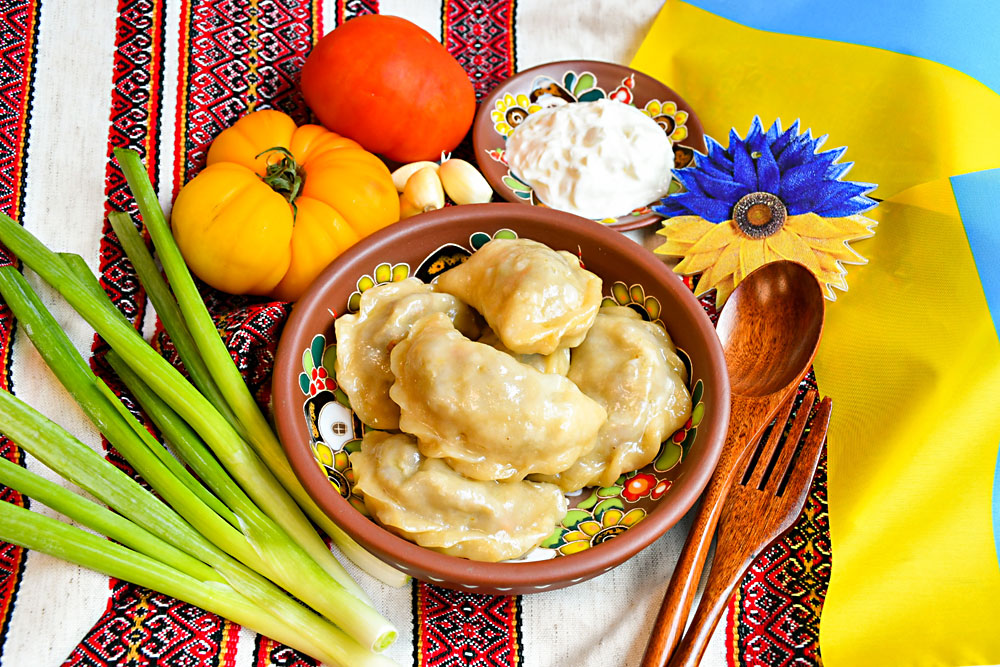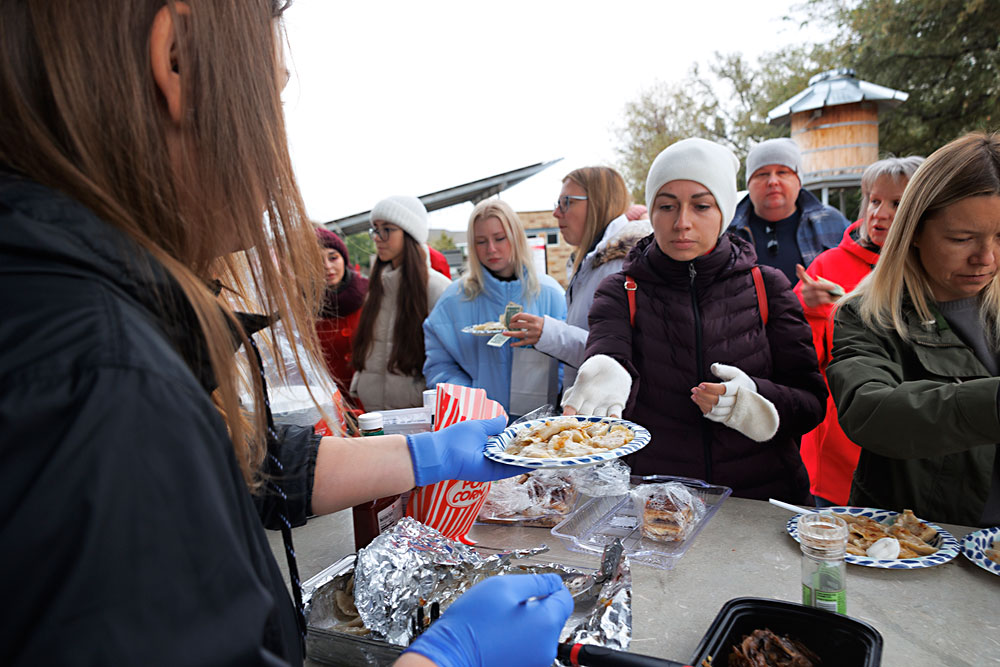Feeding the Ukrainian Resistance With Varenyky and Mutual Aid
To Austin's Ukrainian community, the meaning of food has co-evolved with the war itself
By John Besche, Fri., Nov. 25, 2022

Tonya Levchuk would have laughed her wry, post-Soviet laugh if you asked her how much Ukrainian food she was eating in January 2022. She'd ask, with a smirk, who had the time to cook such old-world things. Like many emerging from the worst of the pandemic, Tonya was doing her best to work, work out, and eke out eight hours of sleep. Peeling vegetables for soups from her native Ukraine took a backseat to the demands, and conveniences, of suburban life.
Then Vladimir Putin launched his invasion of Ukraine on February 24. Levchuk and hundreds of other Ukrainians in Austin watched on tenterhooks as missiles battered their home country. She set up four computer monitors on her dining room table so that she could watch the news, track the destruction, and keep tabs with as many friends and relatives in Ukraine as possible. Now, Tonya and her husband, Daniel, share their home with Tonya's mother, sister, and niece who arrived from Ukraine on tourist visas – and it smells of borsch.
Borsch – the reddish-purple beet-and-cabbage soup commonly known by the Ashkenazi Yiddish transliteration "borscht" – has been a sixth character in Tonya Levchuk's year. From the day she retrieved her family from the Polish-Ukrainian border to now, the intangible foundations of Ukrainian culture and identity have kept her and her community going for nine months.
Levchuk understands the power of those bonds, perhaps more than most. In addition to her day job, she is the executive director of Liberty Ukraine, a local NGO dedicated to sending medical and humanitarian supplies to Ukraine while supporting the 32 Ukrainian refugee families enrolled in their support network programming in Austin. Levchuk has leaned into the unifying – and marketable – elements of culture that have served as pastoral care for the resettled families and an engine for badly needed mutual aid. So far, Levchuk has been able to move mountains – soliciting grants from local grocery stores and arranging food-based fundraisers, among other things – to support the community and the Ukrainian army.
Levchuk and many other Austin-based Ukrainians have spoken about how food connects people and how its cultural, emotional, and physiological significance has meant the world to them in this difficult time – as is true for most displaced people everywhere. What's different about the Ukrainian diaspora is that they have a role to play from home in Putin's war. Reifying their distinct Ukrainian identity at home and in public life through food has been a practical means of survival, but it's also a riposte to Putin's efforts – in words and weapons – to assert that Ukraine never existed in the first place.
To Austin's Ukrainian community, the meaning of food on every level – spiritual, political, physical – has co-evolved in lockstep with the war itself. And it started with coffee.
Кава / Kava – Anxiety
"Kava" is Ukrainian for "coffee." It comes from the Arabic "qahwa" and then Ottoman Turkish "kahve." Russians say "кофе” (kof'ye), which comes from a Western source. In the wake of the war, more and more Ukrainians are shifting away from a bilingual Ukrainian/Russian society – kava is political.
For the first week of the war, Tonya Levchuk subsisted on coffee and water. She was too anxious to eat, too desperate to stay awake, too glued to the monitors to bother with solid food. On one screen, she was able to track her family's westward progress from Kyiv to the border. She and her husband joked about how excited they'd get when they saw the blue dot inch forward by 150 meters.
"I didn't eat for five days," Levchuk said somberly, and then quipped, "it was a good fast!" She explained that even a month after her family moved in with her and her husband, "nobody cared about food." Her family was preoccupied with catching its breath and settling into safety.
Levchuk wasn't the only Ukrainian eating sparingly and sporadically during the first few weeks of the war; many other Ukrainians were in a kava-fueled state, on a mission.
Kateryna "Kate" Voinova woke up panicked, but clear-eyed, on February 24. "I was horrified because I understood that day," Voinova recalled in an interview. "I spoke to my relatives, I spoke to my friends, and I understood the day … I was horrified because I thought if Russia comes to Kyiv and takes the government, Ukrainians will be killed. They will not suffer under Russia … and I was afraid everyone in Ukraine would be killed. And I know I'm emphasizing, you know, but I was super emotional, and I was super frustrated. And I was thinking about Ukrainians in Austin, because I can do something only here, right?"
Voinova works with Liberty Ukraine on event planning and running a new Ukrainian language school. She frames this imperative in apocalyptic terms. "I was thinking about us as the last Ukrainians," Voinova said, "whose duty, whose noble duty, is to preserve Ukrainian culture, to pass it to future generations, just not to let Russia wipe it out from this planet."
Back in Kyiv, Maria Miroshnychenko – a single mother of a 13-year-old boy on the autism spectrum – heeded a mother's intuition. On February 23, Maria was a high-profile translator for the United States Agency for International Development. Her clients included heads of state, prime ministers, and the queen of Sweden. Once the air raid sirens and explosions flooded their otherwise peaceful apartment, her son shut down. "He was just like, 'I'm not talking to you,' and that's when I was like, 'I need to get out,' because I cannot afford to lose his speech," Miroshnychenko said. "We worked really hard for him to start talking."
Just a couple days later, on day two of the war, she was sharing hotel rooms with strangers trying desperately to get her son out of harm's way. She was on "mama bear" adrenaline for days on end, with her son in tow en route to Slovakia and ultimately the United States. She is now enrolled in Liberty Ukraine's mutual aid network, which Levchuk said prioritizes single mothers, particularly single mothers of children with special needs. Now that she and her son are safely resettled in Austin and the dust has started to settle, Maria can start to think about kava, and more importantly, chai, the way she used to in Ukraine.
Борщ / Borsch – Identity
There are many variations of borsch – not to be confused with shchi, a Russian cabbage-based soup – but at its core, borsch is all about beets and cabbage. Every family makes it a little differently and it's common to see potatoes, tomatoes, homemade bone marrow stock, tart apples, and even fish appear in borsch. One universal borsch rule of thumb: It's not done until the ladle can stand up on its own in the pot.
"Ukrainians say 'our food is borsch,'" Miroshnychenko noted in an interview. "It's so rich, it has so much stuff in it, and shchi, not so much. So we Ukrainians are very proud of borsch and say, 'Russians, away from our borsch, go eat your shchi!'"
Shchi is a distinctly Russian food that most Ukrainians would not deign to eat much less consider their own. It's a common joke among Ukrainians that shchi is simply leftover borsch rinsed in water, devoid of flavor. The politics of borsch have played an outsized role in the story of the Ukrainian community in Austin as well as what could be interpreted as the several-hundred-years-long conflict between Russia and Ukraine. It is true that the state now known as Russia began in what is now Ukraine as the Kievan Rus' sometime in the late ninth century. East Slavic nations Belarus, Ukraine, and Russia look to medieval Kyiv as the crucible for a culture that evolved into Minsk, modern Kyiv, and Moscow. Much of Putin's bellicose rhetoric justifying his invasion of Ukraine has focused on cultural erasure. He argues that Ukraine is not a state at all, never has been, and that it and its culture are simply Russia.
Ukrainians, and the international community, did not take to this kindly. In fact, they took it to the United Nations. In July, the UN Educational, Scientific, and Cultural Organization (UNESCO) inscribed "culture of Ukrainian borscht cooking" on its List of Intangible Cultural Heritage in Need of Urgent Safeguarding.
It's these essential but intangible elements of culture and identity that Kate Voinova vowed to protect at a performance of another intangible element of Ukrainian culture, its classical music tradition. Voinova stood before the crowd of the Viva Lviv benefit concert at Austin's Saengerrunde Hall earlier this month to ask, "What if we are the last Ukrainians?" The speech was punctuated by a powerful performance of Boris Lyatoshynsky's musical arrangement of Percy Bysshe Shelley's poem "Ozymandias," which, in context, is an incisive rebuke of a certain hubristic Russian president.
I met a traveller from an antique land,
Who said—"Two vast and trunkless legs of stone
Stand in the desert.… Near them, on the sand,
Half sunk a shattered visage lies, whose frown,
And wrinkled lip, and sneer of cold command,
Tell that its sculptor well those passions read
Which yet survive, stamped on these lifeless things,
The hand that mocked them, and the heart that fed;
And on the pedestal, these words appear:
My name is Ozymandias, King of Kings;
Look on my Works, ye Mighty, and despair!
Nothing beside remains. Round the decay
Of that colossal Wreck, boundless and bare
The lone and level sands stretch far away."
"Once I was asked at the airport, 'Where are you from?'" Voinova related. "I told them I'm from Ukraine, and they asked me, 'Is it a part of Russia?' And I was really shocked. My dream is never to be asked if Ukraine is part of Russia. This is my main intention. And I'm working 24/7 … Since we cannot go and fight, because we are not skilled enough, we are not military people, we need to fight in this area. We need to preserve and to expand Ukrainian culture."
Вареники / Varenyky – Boredom
Second only to borsch in terms of Ukrainian culinary star power, varenyky are highly shareable dumplings that occupy such a significant place in the hearts of the Ukrainian diaspora, a 27-foot-tall monument to the varenyk was built in the town of Glendon, Alberta, Canada. Varenyky are half-moon-shaped braided dumplings – there is usually sour cream in the dough itself – frequently filled with potatoes and farmer cheese, toppings to your discretion. Dessert varenyky recipes might call for a sour cherry compote.
Tonya Levchuk jokes that her wardrobe has shrunk since her family moved in. Her mother, who is always on a diet, is also always making Ukrainian food. Even though her mom rarely eats what she makes, she's thrilled to spend several hours making sausage and airy breads from scratch. She used to own a bakery in Ukraine, and Tonya is quick to point out one among the many differences between Ukrainian and American food cultures: Every cake in Ukraine looks different and tastes different, every cake in America looks different and tastes the same. This is to say that Tonya's mother makes phenomenal bread and that she is bored.
Many resettled Ukrainian families waited months to convert tourist visas into Temporary Protected Status, which allows them to work and stay in the country for at least a year. Since many of Austin's Ukrainian families brought over parents and other older relatives that have retired and don't speak English, they seek comfort in the iterative process of making old-world foods, a lot.
On Facebook, some of the Ukrainian moms who have been cooking constantly have started to sell their food to other Ukrainians. The languid, varenyky-making stage of the Austin Ukrainian community's nine-month ordeal has turned into a mechanism for publicity and mutual aid. Some of Liberty Ukraine's recent fundraisers and community events have platformed refugee moms' time-honored varenyky recipes.
Levchuk says that it's comforting for people to share recipes – or conceal secret techniques – especially when it goes back into the community. Liberty Ukraine hosted a varenyky party on Sunday, Nov. 20, more or less coinciding with Thanksgiving, a holiday that does not exist in Ukraine. Volunteer chefs gathered at Levchuk's house the weekend prior to the party to churn out dozens and dozens of the braided dumplings.
"We want especially older refugees, like moms," Levchuk said. "Because a lot of them don't drive and we want them to find friends in this community, to share their recipes because it's going to be a big topic. 'Oh, how did you make your varenyky? What's your secret?'"
Despite the cold and rain, the party saw a healthy turnout in Leander, where many Ukrainians are resettled. The point, Levchuk said, was to gather the community for a mutual aid swap. Refugees and volunteers could figure out who needs what, and hopefully get their needs met. Levchuk distributed $500 H-E-B gift cards, provided through a grant from the grocer, to 20 single Ukrainian mothers. The proceeds from the sales of the varenyky will be distributed among the refugees who prepared them.
Медовик / Medovik – Hope
Medovik is Ukraine's sour-cream-and-honey-infused answer to the mille-feuille.
For those Austinites, Ukrainian or otherwise, interested in supporting the community but unable to attend the varenyky party, there is another culinary intervention, and it's open five days a week.
Ukrainian chefs Alla Shelest and Mariana Shelestiuk opened the area's first Ukrainian restaurant, U cuisine (delivery only; order at ucuisine.us), in mid-June. "After the invasion," Shelestiuk said, "I felt a big impulse to do something. You have to do something your way, and our way is food. Some will go to rallies, some will donate, some will write articles, this is our way to talk about Ukraine, this is our way to share what Ukraine is, how great it is, how tasty it is." Shelestiuk described the restaurant's opening – which came only three months after Putin launched his invasion of Ukraine – as a celebration, a "light in darkness" drawing families from as far away as Dallas and Houston. Now, she says, U cuisine is even drawing American regulars.
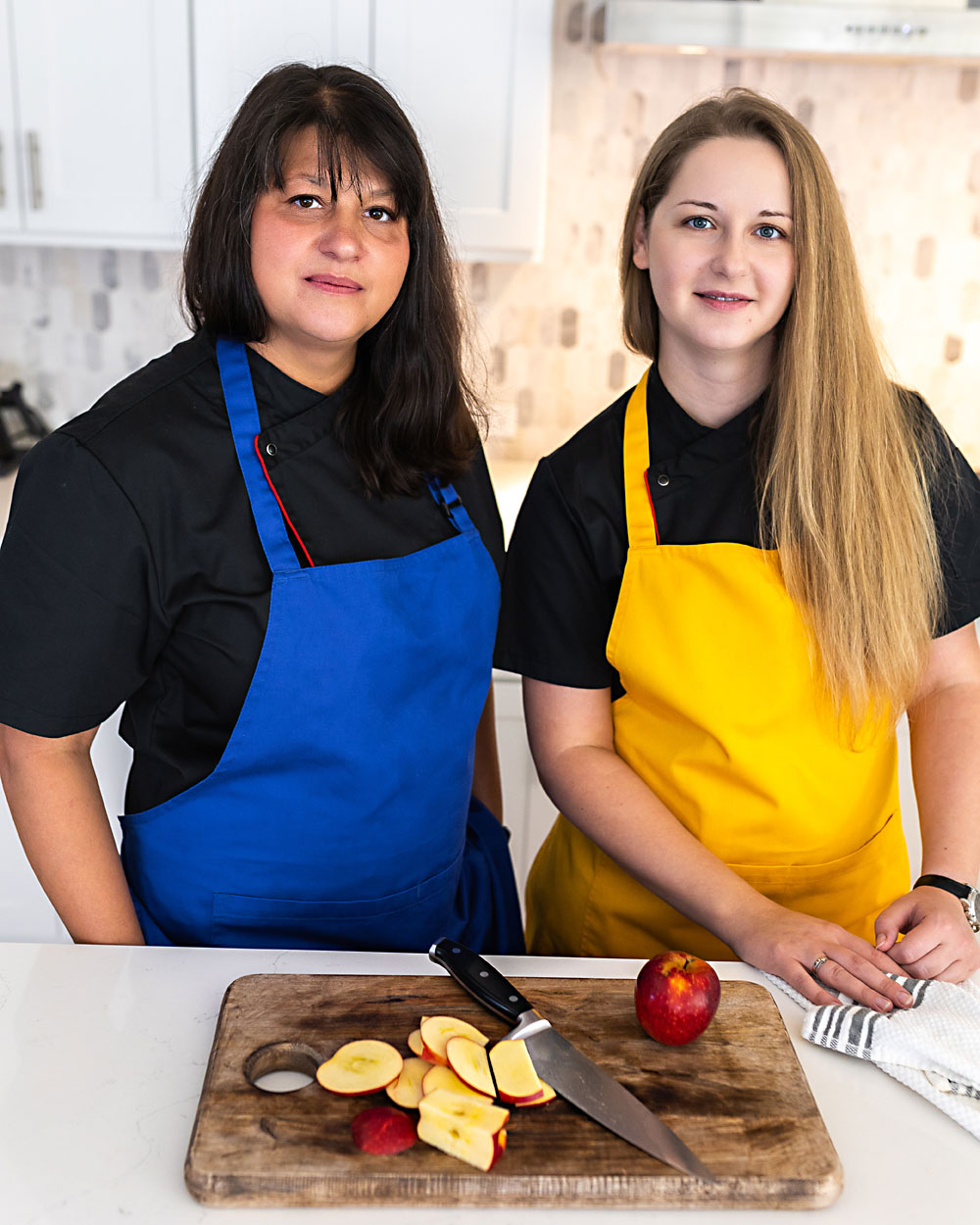
It's a point of pride for Shelestiuk and Shelest to give back to the community in material as well as cultural terms. U cuisine has hosted fundraisers where they donated a percentage of the proceeds to Liberty Ukraine. Even when there isn't a fundraiser happening, U cuisine spreads knowledge about Ukraine through little cards that they include with every meal. On the front side of a card boasting fast facts about borsch, there's the U cuisine logo, which Shelestiuk said is stylized with wheat to represent the country's role as the breadbasket of Europe – though this has been under threat as a result of the war. For to-go customers, Shelestiuk and Shelest stamp a sunflower, one of the national symbols of Ukraine, on the outside of the brown bag.
For Voinova, the legions of Ukrainian mothers and professional chefs in Austin spell hope for her community and her culture. "Russia tried to steal our borsch! Yes. Maybe three years ago, some Russian performer made this music video where he was showing borsch as a part of Russian culture," Voinova said. "So he had tacos for Mexicans and Asians with sushi rolls, and he made borsch with Russian outfits … this is ridiculous, right? People are fighting for soup, basically like a beet soup? What difference does it make? But when we realize Russians tried to steal borsch for centuries, it was a small victory when UNESCO confirmed that this is Ukrainian food and we need to preserve it."
Voinova noted that food is shareable and that she does not want to share the pain she has experienced due to the war, but rather her love for Ukraine. Most of the people she speaks with were not born in Kyiv. "They do not know every centimeter of my favorite city and they cannot feel my pain when Russia is shelling architecture from the 11th century. I feel that but I cannot express that. But what can I share? I can share the food made by Ukrainian women. We have awesome bakery teams. They are making pastries, they're making pies. And we have a Ukrainian restaurant here. And I'm really grateful for those people, they are baking this with love, and a little bit of sadness, of course."
Voinova is no longer as worried as she once was about being the "last Ukrainians." She points to her Ukrainian language school, the abundance of Ukrainian flags around Austin, and a willingness in the community to sing Ukrainian songs every week at the state Capitol.
As Dr. Daniel Swayze, executive director of Beerthoven and emcee at Viva Lviv, pointed out in response to the tone of the night's programming and its speeches, there are Ukrainians naming newborn children after the Javelin anti-tank missile. These people have fight in them.





